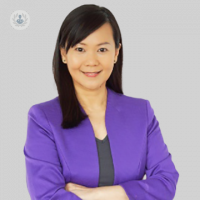Thyroid disorders in children: a comprehensive guide
Written by:Leading consultant paediatric endocrinologist and consultant paediatrician Professor Sze May Ng, OBE provides a comprehensive guide to thyroid disorders in children, including treatment options.

What are the most prevalent thyroid disorders?
Thyroid disorders in children typically fall into two categories: hypothyroidism, where there's a deficiency of thyroid hormones, and hyperthyroidism, where there's an excess of circulating thyroid hormones. Hypothyroidism can be congenital, meaning present at birth, due to the thyroid gland being underactive (athyrosis) or improperly formed (dysgenesis), is termed congenital hypothyroidism. This condition, can also be due to thyroid dyshormonogenesis, which is often due to genetic defects in the synthesis of thyroid hormones. Newborns in the UK and most developed nations are routinely screened for congenital hypothyroidism through a test known as newborn screening.
What are the common signs and symptoms of different thyroid disorders?
Hypothyroidism is typically identified through symptoms and signs such as fatigue, insomnia, weight gain, slowed growth, cognitive difficulties, poor concentration, depression, and physical indicators like a swollen gland in the neck (goitre), dry skin, swollen calves, sensitivity to cold, irregular menstrual cycles, and feeding issues in infants. These manifestations help to diagnose hypothyroidism, ensuring proper management.
Hyperthyroidism presents with symptoms over high thyroid hormone levels including difficulty concentrating, insomnia, fatigue, rapid heartbeat, sweating, trembling hands and heat sensitivity, as well as unexplained weight loss, menstrual irregularities, and feelings of anxiety. Some individuals may also experience bulging eyes.
How are thyroid disorders diagnosed?
Diagnosis of thyroid disorders, whether hypothyroidism or hyperthyroidism, typically requires a thyroid function test. It is recommended to conduct this test in primary care settings like a GP's surgery to assess hormone levels. If abnormalities are detected, referral to a paediatric endocrinologist is often necessary for further evaluation and management.
What are the available treatment options for various thyroid conditions?
To treat hypothyroidism, the standard approach is replacement therapy using levothyroxine tablets. This treatment is administered orally, even in newborns, where crushed tablets are given with their feeds.
For hyperthyroidism, the aim is to block the overactive gland's production of thyroxine. This is typically achieved through antithyroid medications such as propylthiouracil and carbimazole. Long-term management options may include surgery to remove the gland or radioactive iodine treatment. These treatments are comparable to those used in adults, and the overall management approach is similar.
If you are concerned about thyroid disorders and would like to book a consultation with Professor Ng, you can do so by visiting her Top Doctors profile today.


